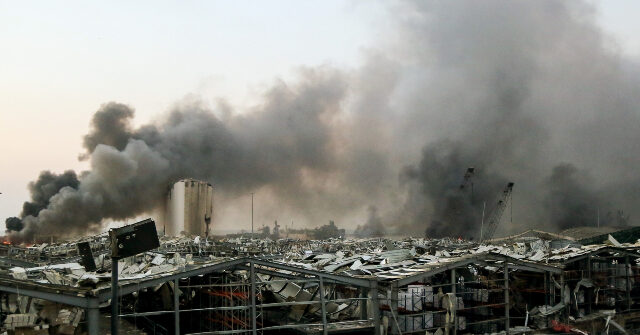Police in Bulgaria reportedly arrested Russian national Igor Grechushkin on Monday, almost five years after a cargo ship owned by Grechushkin was linked to the massive explosion at the Port of Beirut on August 4, 2020.
The explosion, which killed 218 people and injured more than 6,000 others, destroyed much of the Port of Beirut and inflicted billions of dollars in damages on an already-impoverished Lebanon. Sporadic investigations have been conducted over the past five years, with a great deal of interference from various Lebanese factions, including the Iran-backed terrorists of Hezbollah.
To date, not a single official in Lebanon has been held accountable for the disaster, despite protest marches and pleas for justice from families of the victims.
The source of the explosion is believed to have been a huge cache of ammonium nitrate that was improperly stored at the port. Ammonium nitrate can be used as a fertilizer, but as the grim events of August 4, 2020, demonstrated, it can also make a very powerful explosive.
Investigators say the shipment of 2,750 tons of ammonium nitrate was brought to the Port of Beirut in 2013 by the MV Rhosus, a cargo ship owned by Grechushkin. The shipment was supposedly destined for Mozambique. The Rhosus was not scheduled to dock in Beirut. It ostensibly made a detour to pick up more cargo, so its voyage would be more profitable, but port officials said the additional cargo was too heavy for the ship to handle.
The Rhosus was impounded for mechanical violations and unpaid port fees by Lebanese officials soon after its arrival and its deadly cargo was transferred to a warehouse, where it remained until the explosion in 2020. The Rhosus never left the Port of Beirut – it sprang a leak and sank in February 2018.
Terrorism watchdog groups argued that shady tactics and phony paperwork were employed to conceal the true purpose of the shipment: to deliver a huge quantity of explosives to Hezbollah terrorists in Lebanon. As massive as the Beirut blast was, explosives experts said its yield was only about half of what would have been expected from 2,750 tons of ammonium nitrate. The other half of the deadly cargo appears to have been siphoned out of the warehouse during its six years of storage.
Lebanese judges issued arrest warrants for Grechushkin and the captain of the Rhosus, Boris Prokoshev, almost five years ago. The Lebanese judiciary said on Monday that Bulgarian police, acting on a “red notice” from Interpol issued in early 2021, arrested Grechushkin at Vasil Levski Sofia Airport when he arrived on a flight from Cyprus.
Lebanese prosecutors have filed paperwork to have Grechushkin extradited, but if that request is not granted, they said they are prepared to travel to Bulgaria to question him.
Bulgarian officials said on Monday they will “now oversee whether there is enough evidence to begin an extradition process.” They hinted at a possible roadblock by referring to Grechushkin as a “Cypriot citizen.”
As for Prokoshev, he said in 2021 he was “shocked” to discover he was the subject of an Interpol red notice and did not “understand at all what could be the basis for my arrest.” He blamed Lebanese officials for creating a dangerous situation by refusing to let the Rhosus leave port with its huge cargo of explosives.
“They should have gotten rid of the vessel right away instead of confiscating it and demanding fees for harboring it,” the captain told Radio Free Europe (RFE) a few days after the explosion.
“Secondly, we are talking about ammonium nitrate here. They could have used it for their fields. Nobody was claiming it, which means it belonged to nobody,” he continued.
Prokoshev was highly critical of Grechushkin for diverting the Rhosus to Beirut for more cargo and for abandoning the crew in Lebanon without even paying their wages. He said he and the crew wanted to sue Grechushkin for their unpaid salaries, but were unable to find him. He also found it curious that the alleged buyers of the ammonium nitrate in Mozambique never complained about their undelivered million-dollar shipment.
Interpol and the Lebanese judiciary did not seem concerned about Prokoshev’s whereabouts on Monday, focusing instead on Grechushkin, who could lead them to other shadowy figures involved with the Rhosus and its final voyage.
Lebanese President Joseph Aoun, a former military commander elected in January 2025 to fill a three-year vacancy in the presidential office, campaigned on a promise to investigate the Beirut blast and bring justice to the families of the victims.
Speaking on the fifth anniversary of the explosion in August, Aoun promised his administration remains “committed to uncovering the whole truth, no matter the obstacles or how high the positions.”
“We are working with all available means to ensure the investigations are completed with transparency and integrity,” he said.
“The blood of your loved ones will not be in vain. Justice is coming, accountability is coming,” Aoun told families of the victims.
Read the full article here
